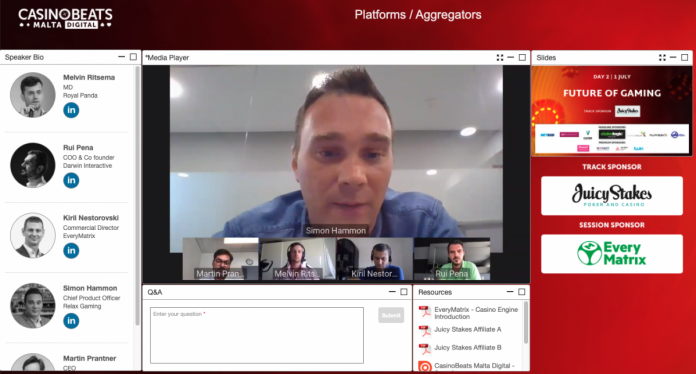Melvin Ritsema, managing director of Royal Panda, said the amount of work that now goes into offering casino content means it’s no longer doable via direct integration for all game suppliers.
Speaking as part of a ‘Future of Gaming’ panel at CasinoBeats Malta Digital debating the use of aggregators for igaming operators, Ritsema explained: “Let’s say as a rough estimate we have between 50 and 100 game suppliers live on Royal Panda right now.
“Let’s be optimistic and say the integration of one game supplier is two weeks. Even on the lower end of 50 suppliers for an operator, that’s 100 weeks of development or two full years.
“And that’s just the development work, then we need the legal work, regulatory approval, upkeep of the APIs and upgrades. The amount of work that goes into offering all this type of content has become so much that it’s not doable with direct integration anymore.”
Rui Pena, COO & co founder at Darwin Interactive, bemoaned the obsession on quantity over quality or innovation of games. He suggested that the casino market feels “much the same” and that it leaves operators competing just on sign up bonuses, deposit bonuses or other kinds of loyalty programmes.
Ritsema replied: “I’m afraid overall it has become a bit of a numbers game. Yes, the casinos want quality content, but as a studio you can put all your eggs in one big basket – you are still not sure it will be a success until it goes to market.
“The landscape has changed a lot in terms of how many games are coming out. Nowadays if you release one game, and casinos have a lobby of 3,000, it’s going to be very hard to stand out. Before you can prove that your game will be the most popular, or the most successful, it is a big ask for the operator to bet on this.”
Kiril Nestorovski, commercial director at EveryMatrix, said that the importance of data is often overlooked as an advantage for the aggregation model, alongside the increased speed to market and distribution reach.
He explained: “Aggregators have algorithms developed following closely what players are looking at, and we can tweak the casino lobby based on preferences. We sit on a lot of data. Being part of an aggregation network you get access to that data, which is also very segregated for countries in terms of player preferences.”
The panelists were later asked by session moderator Martin Prantner, CEO at Finnplay, about the value for an aggregator in having your own remote gaming server (RGS) and housing your own content alongside that of your partners.
Simon Hammon, chief product officer at Relax Gaming, replied: “A few years ago, a lot of content suppliers were very dependent on a middle layer platform, then there was a shift where having your own RGS brought a perception of larger independence.
“And that’s true, you can do direct integrations with operators, you can do multi-aggregator integrations but as there’s a huge volume of content, and more price and ROI pressure, having your own platform and RGS these days can actually be a hindrance because there’s far more regulated market pressure and compliance maintenance.”
Hammon added that in-house content was a great complement to an aggregation service, especially for game margins, but admitted there is a fine line in terms of pushing your own content and maintaining high visibility for partners.
He continued: “One of the main problems the industry has is there’s so much fragmentation. There are 200 or 300 suppliers that an operator may have, and fundamentally you can’t market each of them equally, they all have different tools, back offices etc.
“There needs to be harmonisation where possible and aggregators are perfectly placed to provide that, at least for a good portion of the content suppliers. Value added tools that transcend the content suite can create harmonisation across the board.”
Ritsema jumped in to add that market availability is another key point for an aggregator’s service. He said: “Where games are allowed to play from a licensing point of view and grey markets point of view. Some aggregators have a lot of licensed jurisdictions they provide for, some have less, but others are quite restricted.”
A point acknowledged by Hammon, who concluded: “We’re in a regulated world. The more regulated markets an aggregator or sub studio is in is obviously of benefit to the operator.
“We try and walk the right line to make sure we are fully compliant in the markets which are key for our operators, but also offer the expanding opportunities that people are trying to tease open – for example in South America, Africa or Asia. How flexible you are in those types of territories offer a vehicle for operators to expand their reach.”
CasinoBeats Malta Digital, delivered in association with Gaming Malta, takes place from 30 June to 2 July 2020 and features 40 virtual exhibitors, numerous networking opportunities, 130 leading speakers, and countless business opportunities for 3,000 senior decision-makers from operators, suppliers, affiliates and other industry stakeholders.
Alongside the exhibition, networking and conference, all delegates also gain access to the full range of entertainment on offer, including free-play slots, daily competitions and a selection of prizes such as iPads and cash.
Find full details of the event, including information about how to register and the discounts available on company group passes, at the event’s official website: https://sbcevents.com/casinobeats-malta-digital/














